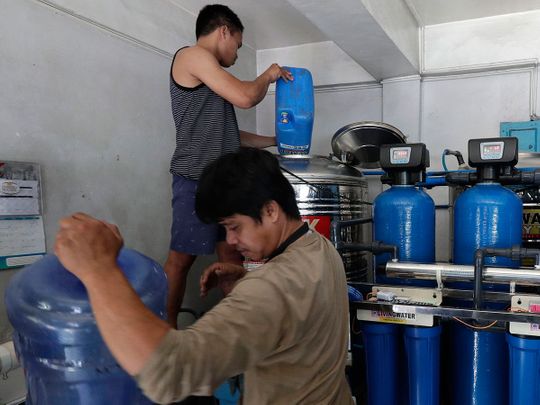
Manila: Authorities have admitted shortcomings that led to a water shortage in parts of southern and eastern Metro Manila as well as the province of Rizal.
The Office of the Civil Defence (OCD), in a statement, said an anticipated sudden increase in the water consumption in certain areas of the metropolis which is serviced by the private water utilities concessionaire, Manila Water caused the massive water service disruption.
“The declining (level) of La Mesa Dam, according to MWSS (Manila Waterworks and Sewerage System), is caused by the increase in water treatment production of Manila Water” the OCD said.
As a result of the water supply disruptions, several areas observing mandatory cut off in services and this will last until June.
Since early this week, water supply interruptions have been experience in the cities of Mandaluyong, Pasig, San Juan, Taguig, and Marikina; the municipality of Pateros; parts of Makati, Manila, and Quezon City; and in the province of Rizal, the towns of Angono, Baras, Binangonan, Cainta, Cardona, Jalajala, Morong, Pililia, Rodriguez, Tanay, Taytay, Teresa, San Mateo and Antipolo.
This led to long lines at the public watering stations as local governments adopt to water rationing.
“We want to assure the public that the public that the government is doing everything to ensure adequate water supply for all,” OCD administrator, Undersecretary Ricardo Jalad said on Thursday.
Earlier, authorities told the people to prepare for the El Nino long dry spell. But as it turned out, the effects of the extended dry weather was made worse by the lack of preparation by authorities.
In Mandaluyong, the city government is planning to declare a “state of calamity” if the situation does not improve in the coming days. The city is among the most progressive urban areas in the country and is the location of some of the biggest malls and commercial districts.
Other than the malls, hospital operations in the affected areas are also being disrupted as taps run dry. Senator Richard J. Gordon, chairman of the Philippine Red Cross, has ordered the deployment of water tankers to the Rizal Medical Centre to help ensure an available supply of potable water in the 300-bed hospital.
“At the request of Health Sec. Francisco Duque, we provided water tankers at Rizal Medical Centre. This should help the patients who are vulnerable due to lack of potable and clean water in the hospital. This, like our responses to the measles outbreak and fire incidents,” he said.
Senate President Vicente C. Sotto III last Wednesday filed a resolution directing the Senate Committee on Public Services to conduct an investigation on the current water crisis in Metro Manila and nearby areas.
While some attributed the crisis to the El Niño phenomenon, others blamed the water service concessionaires, “hence the need to review the concession agreements with them,” Sotto said.
“The inadequate or lack of water supply has caused inconvenience to the affected residents, students and patients,” the resolution stated.
“If left unresolved, the water crisis may bring more serious problems to the people and businesses in the affected areas, and may impact the country as a whole,” it added.











